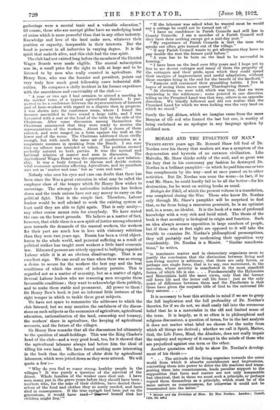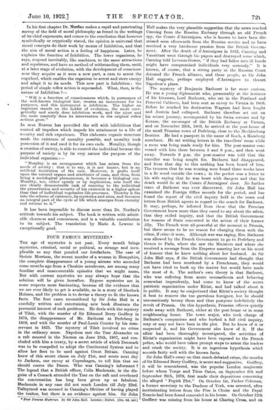MORALS AND THE EVOLUTION OF MAN.*
TWENTY-SEVEN years ago Mr. Bernard Shaw fell foul of Dr. Nordau over his theory that modern art was a symptom of the degeneration and hysteria of an outworn civilization. Like Malvolio, Mr. Shaw thinks nobly of the soul, and so great was his fury that in his customary gay fashion he destroyed Dr. Nordau in a brilliant pamphlet—in which he paid him one or two fine compliments by the way—and at once passed on to other activities. But Dr. Nordau was none the worse—in fact, if he read Mr. Shaw, he could hardly fail to be all the better—for his
destruction, for he went on writing books as usual.
Biologie der Ethi1, of which the present volume is a translation, was completed during the War. Those who know Dr. Nordau only through Mr. Shaw's pamphlet will be surprised to find that, so far from being a rancorous pessimist, he is an optimist and, in a sense, an idealist. It is the book of a man of profound knowledge with a very rich and lucid mind. The thesis of the book is that morality is biological• in origin and function. Such an idea always arouses opposition in large numbers of people, but if those who at first sight are opposed to it will take the trouble to examine Dr. Nordau's philosophical presumptions, they will probably end by moderating their opposition very considerably. Dr. Nordau is a Monist. " Similar manifesta- tions," he writes.
" in inanimate matter and in elementary organisms seem to justify the conclusion that the distinction between living and non-living matter is arbitrary, that there are only forces, or perhaps one single force, that is to say, one movement, in the universe, whose activity is manifested in the most manifold forms, of which life is one. . . . Fundamentally the Hylozoiste and Materialists hold the same views, only that the former call force life and the latter call life force : just as the only point of difference between them and the Pantheists is that these have given the majestic title of God to the universal life they assume. . . ."
It is necessary to bear this attitude in mind if we are to grasp the full implication and the full profundity of Dr. Nordau's theories, for if we do not, we shall easily fall into the erroneous belief that he is a materialist in the old and limited sense of the term. It is largely, as it so often is in philosophical and religious discussions, a question of terms, for in the last analysis it does not matter what label we choose for the unity from which all things are derived ; whether we call it Spirit, Matter, God, the Life Force, Mind, the Absolute, does not really impair the majesty and mystery of it except in the minds of those who
are prejudiced against one term or the other.
Another quotation will help to show Dr. Nordau's develop.
ment of his thesis :—
" . . . The attitude of the living organism towards the outer world from which it absorbs nourishment and impressions, converting them into power to drive the life machine and trans- muting them into consciousness, lends peculiar support to the supposition that force and matter are not only inseparable but identical, that in them we must seek a principle, or perhaps regard them themselves as a principle, which must be of the same nature as consciousness, for otherwise it could not be transmuted into the latter."
• Morals and On Evolution at Man. By Max Nordau. London : Cassell. 110s. ad. net.) In his first chapter Dr. Nordau makes a rapid and penetrating survey of the field of moral philosophy as found in the writings of its chief exponents, and comes to the conclusion that however symbolically or cryptically stated, the opinion is universal that moral concepts do their work by means of Inhibition, and that the aim of moral action is a feeling of happiness. Later, he explains the function of Inhibition. The lower organisms, he says, respond inevitably, like machines, to the same attractions and repulsions, and have no method of withstanding them, until, at a later stage of evolution, with the development of conscious- ness they acquire as it were a new part, a cam to arrest the cogwheel, which enables the organism to arrest and store energy and adapt it to its needs. This new part is Inhibition : the period of simple reflex action is superseded. What, then, is the nature of Inhibition 1— "Will is a function of consciousness which, in pursuance of the well-known biological law,- creates an instrument for its
• purposes, and this instrument is inhibition. The higher an organism stands on the ladder of evolution, the more ener- getically and surely does inhibition work, and the nicer and the more masterly does its intervention in the original reflex actions grow."
In m- in Reason has provided the will with inhibitions that control all impulses which impede his attainment to a life of security and rich experience. This elaborate organic structure made the existence of morality possible, and morality took possession of it and used it for its own• ends. Morality, though a creation of society, is able to control the individual because the purpose of society is by its very nature the purpose of the individual organism :- "Morality is an arrangement which has arisen from the needs of society : that is to say, it is not innate, but is an artificial institution of the race. However, it grafts itself upon the natural organs and attributes of man, and thus, from being a sociological phenomenon, it becomes a biological one. Morality, too, either openly or by implication, sots itself the one clearly demonstrable task of ensuring to the individual the preservation and security of his existence in a higher sphere than that of individual vegetative life processes. Thereby it fits into the scheme of existence, its mysteries and aims, and becomes an integral part of the cycle of life which emerges from eternity and returns to it."
It has been impossible to discuss more than Dr. Nordau's attitude towards his subject. The book is written with admir- able clearness and conciseness, and is a valuable contribution to its subject. The translation by Marie A. Lowenz is exceptionally good.



































 Previous page
Previous page